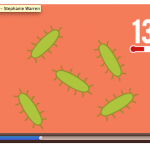Open Notebook Science – the Carl Boettiger Interview
 Carl Boettiger, a pioneer of the Open Notebook Science movement, shares some reflections and gives some advice to those who want to join in.
Carl Boettiger, a pioneer of the Open Notebook Science movement, shares some reflections and gives some advice to those who want to join in.Accordingly, a global community of scientists have finally taken the last steps towards total openness and become Open Notebook scientists, hence ”making the entire primary record of a research project publicly available online as it is recorded” [Wikipedia]. This means that they are giving the world— both friend and foe—free access to their lab notes (sometimes even including failed experiments) as well as raw data and unpublished results.
 Carl has an extraordinarily structured personal homepage, including a thorough description of his Experiments with Open Science. Scientia Crastina decided to get in touch for some questions.
Carl has an extraordinarily structured personal homepage, including a thorough description of his Experiments with Open Science. Scientia Crastina decided to get in touch for some questions.How did you become a open notebook scientist in the first place?
By accident I suppose. As a theorist I was never trained to keep a lab notebook — and didn’t, for the first two years of my PhD. Aware of the practice among wet lab researchers and frustrated by my own inability to reference what I had done months earlier, I started looking around for examples. Naturally I began with Google and thus hit upon the (open) notebook of UK experimental chemist Cameron Neylon, (La)blog. Despite the differences in our fields I was impressed by the effectiveness with which Cameron leveraged a digital web platform for a lab notebook. Some of these had nothing to do with being open, others did. i thought I would give it a try.
I experiment with my technical platform as a way of discovering, testing, and sharing tools that assist my workflow and my research. I discuss some of the more valuable features I have come across in technical detail in a growing series of posts.
No. I try to be upfront with my own collaborators about this, and respectful of their concerns. At times this means keeping certain content private, at least delaying release until after publication. Open Notebook badges help me be transparent about this.
Are you still convinced that getting scooped is not a major problem?
Being scooped is part of science whether you keep and open notebook or never talk about your work. Sharing your work can make it more likely that someone will scoop you; but it may also discourage others from working on a topic they see as “taken”, and thus less likely that someone scoop you. Such effects are difficult to measure or infer.
- Claire Price of Crastina receives outreach award from Royal Society of Biology - October 25, 2020
- Agile Science student project at Brussels Engineering School ECAM: “We can’t wait to try it again!” - August 28, 2020
- Create an infographic in the Lifeology SciArt Infographic Challenge - June 16, 2020
- Adam Ruben – The scientist that teaches undergraduate students comedy - March 27, 2020
- Sam Gregson, Bad Boy of Science: “Comedy helps to bridge the gap” - March 10, 2020
- The Coolest Science Merchandise of 2019 - December 16, 2019
- Science Media Centre (UK) offers guide on dealing with online harassment in academia - November 26, 2019
- Agile project management taught to students and researchers at Karolinska Institutet - September 20, 2019
- Stefan Jansson: Improve your credibility! (Crastina Column, September 2019) - September 6, 2019
- The People’s Poet: Silke Kramprich, tech communicator - August 31, 2019





Trackbacks & Pingbacks
[…] Open notebook science […]
[…] Open notebook science […]
[…] Open notebook science […]
Leave a Reply
Want to join the discussion?Feel free to contribute!